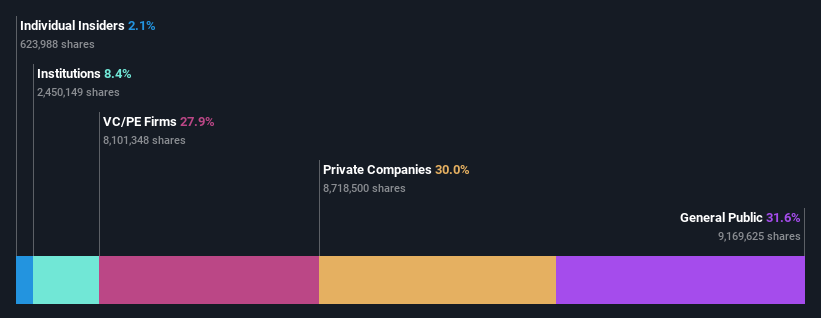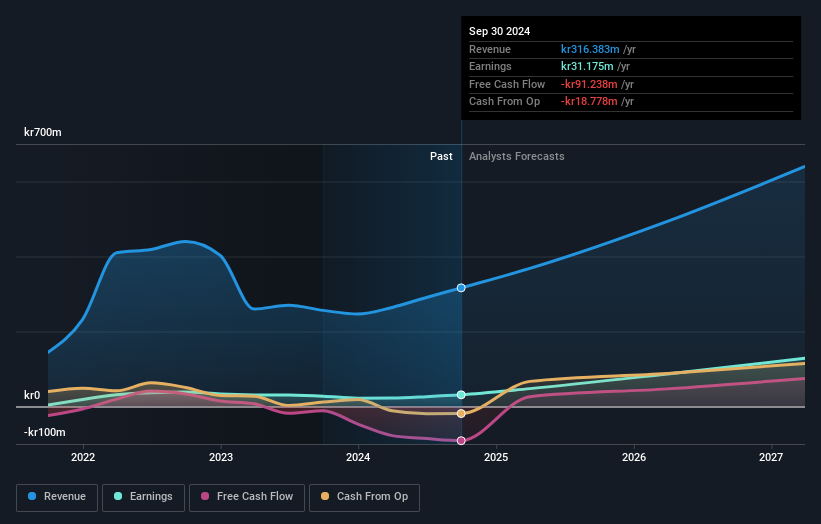- Sweden
- /
- Healthcare Services
- /
- OM:EQL
EQL Pharma AB (publ)'s (STO:EQL) last week's 11% decline must have disappointed individual investors who have a significant stake

Key Insights
- Significant control over EQL Pharma by individual investors implies that the general public has more power to influence management and governance-related decisions
- A total of 2 investors have a majority stake in the company with 58% ownership
- Past performance of a company along with ownership data serve to give a strong idea about prospects for a business
If you want to know who really controls EQL Pharma AB (publ) (STO:EQL), then you'll have to look at the makeup of its share registry. We can see that individual investors own the lion's share in the company with 32% ownership. In other words, the group stands to gain the most (or lose the most) from their investment into the company.
As a result, individual investors as a group endured the highest losses last week after market cap fell by kr279m.
Let's take a closer look to see what the different types of shareholders can tell us about EQL Pharma.
Check out our latest analysis for EQL Pharma

What Does The Institutional Ownership Tell Us About EQL Pharma?
Many institutions measure their performance against an index that approximates the local market. So they usually pay more attention to companies that are included in major indices.
As you can see, institutional investors have a fair amount of stake in EQL Pharma. This suggests some credibility amongst professional investors. But we can't rely on that fact alone since institutions make bad investments sometimes, just like everyone does. When multiple institutions own a stock, there's always a risk that they are in a 'crowded trade'. When such a trade goes wrong, multiple parties may compete to sell stock fast. This risk is higher in a company without a history of growth. You can see EQL Pharma's historic earnings and revenue below, but keep in mind there's always more to the story.

Hedge funds don't have many shares in EQL Pharma. Looking at our data, we can see that the largest shareholder is Cadila Pharmaceuticals Limited with 30% of shares outstanding. With 28% and 4.3% of the shares outstanding respectively, FÅRö Capital Ab and SEB Investment Management AB are the second and third largest shareholders. Furthermore, CEO Axel Schorling is the owner of 1.1% of the company's shares.
After doing some more digging, we found that the top 2 shareholders collectively control more than half of the company's shares, implying that they have considerable power to influence the company's decisions.
While it makes sense to study institutional ownership data for a company, it also makes sense to study analyst sentiments to know which way the wind is blowing. There is some analyst coverage of the stock, but it could still become more well known, with time.
Insider Ownership Of EQL Pharma
The definition of an insider can differ slightly between different countries, but members of the board of directors always count. The company management answer to the board and the latter should represent the interests of shareholders. Notably, sometimes top-level managers are on the board themselves.
Most consider insider ownership a positive because it can indicate the board is well aligned with other shareholders. However, on some occasions too much power is concentrated within this group.
We can report that insiders do own shares in EQL Pharma AB (publ). It has a market capitalization of just kr2.2b, and insiders have kr47m worth of shares, in their own names. It is good to see some investment by insiders, but we usually like to see higher insider holdings. It might be worth checking if those insiders have been buying.
General Public Ownership
With a 32% ownership, the general public, mostly comprising of individual investors, have some degree of sway over EQL Pharma. While this size of ownership may not be enough to sway a policy decision in their favour, they can still make a collective impact on company policies.
Private Equity Ownership
With an ownership of 28%, private equity firms are in a position to play a role in shaping corporate strategy with a focus on value creation. Sometimes we see private equity stick around for the long term, but generally speaking they have a shorter investment horizon and -- as the name suggests -- don't invest in public companies much. After some time they may look to sell and redeploy capital elsewhere.
Private Company Ownership
Our data indicates that Private Companies hold 30%, of the company's shares. It might be worth looking deeper into this. If related parties, such as insiders, have an interest in one of these private companies, that should be disclosed in the annual report. Private companies may also have a strategic interest in the company.
Next Steps:
I find it very interesting to look at who exactly owns a company. But to truly gain insight, we need to consider other information, too. Case in point: We've spotted 2 warning signs for EQL Pharma you should be aware of.
Ultimately the future is most important. You can access this free report on analyst forecasts for the company.
NB: Figures in this article are calculated using data from the last twelve months, which refer to the 12-month period ending on the last date of the month the financial statement is dated. This may not be consistent with full year annual report figures.
Valuation is complex, but we're here to simplify it.
Discover if EQL Pharma might be undervalued or overvalued with our detailed analysis, featuring fair value estimates, potential risks, dividends, insider trades, and its financial condition.
Access Free AnalysisHave feedback on this article? Concerned about the content? Get in touch with us directly. Alternatively, email editorial-team (at) simplywallst.com.
This article by Simply Wall St is general in nature. We provide commentary based on historical data and analyst forecasts only using an unbiased methodology and our articles are not intended to be financial advice. It does not constitute a recommendation to buy or sell any stock, and does not take account of your objectives, or your financial situation. We aim to bring you long-term focused analysis driven by fundamental data. Note that our analysis may not factor in the latest price-sensitive company announcements or qualitative material. Simply Wall St has no position in any stocks mentioned.
About OM:EQL
EQL Pharma
Engages in the development, marketing, and sale of generic medicines to pharmacies and hospitals in Sweden, Denmark, Norway, Finland, and the rest of Europe.
Exceptional growth potential with proven track record.
Similar Companies
Market Insights
Community Narratives



